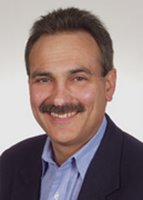« Home | MacBoy vs PCdrone: More Great TV Ads of What Makes... »
Howard Stern and "New" Radio: More Up Close with John Parikhal
 Last Friday, we posted an upcoming interview from fmqb.com which got Up Close with Joint Communications CEO John Parikhal. As usual, John pulls no punches serving as one of the radio industry's trusted sages for views on the future.
Last Friday, we posted an upcoming interview from fmqb.com which got Up Close with Joint Communications CEO John Parikhal. As usual, John pulls no punches serving as one of the radio industry's trusted sages for views on the future.
In the post, John talked about the listener disconnect for both the music and radio industries; how the younger generations view radio; the prospects of HD Radio and more.
In today's continuation of the lengthy interview, John talks about Howard Stern, including why he left and how it impacts terrestrial radio now that he's gone as well as his prospects on satellite radio. Plus, The FCC, Oprah Winfrey on XM, some insight on Opie and Anthony and how the new forms of radio are continuing to evolve.
Interviewer FMQB CEO Fred Deane digs in and gets even more Up Close:
FMQB: You have always valued air talent as precious gems for radio. Why did terrestrial radio allow marquis talent to shift to satellite? Did the FCC indecency crackdown leverage strategy in this area?
Parikhal: Radio did face the FCC head on, and the FCC was extremely aggressive in attacking the Howard Stern's of the business. With Opie & Anthony, you can make an argument that once people started listening to them it was shocking what they were doing. There was a period (early on) when they were on the radio and were having women put coke bottles in their vaginas, and because they had this small 18-24-year-old audience listening who loved them to death and nobody else was listening, there were no complaints. O&A only got caught when their ego got in the way, and they got on a lot of markets and were heard more, and then they did really stupid things and eventually they got caught with the church incident.
Stern, on the other hand, actually saw his ratings and audience increase after they stopped him from doing all the really rude stuff and let him go to what his really core talent was, but even that wasn't enough. From Stern's standpoint, there was almost nothing that was going to keep the guy. He was gone, "I have to be that careful about stepping over the line, I want to go do something entirely different."
Stern was one of those situations where it was probably a combination of ineffectual management at the top and Stern wanting to try something different. They probably could have kept him, but they were really worried about the FCC.
FMQB: Infinity had battled the FCC in the past regarding Stern fines, did it get too risky for radio to continue to defend some of the more egregious stunts?
Parikhal: With Bubba's killing a pig in a parking lot kind-of-thing, and with the O&A St. Patrick's incident, they just went too far. However, had management worked with them, they could have done the same thing they did with Howard Stern which was still kept him at the edge without going too far. It really was a combination of the FCC and management that didn't have the skill set to deal with extremely edgy/dangerous talent. That's pretty clear right now. We saw it earlier this year with CBS for example. The skill set on managing and developing talent doesn't appear to be there at the senior levels. I've tried to discuss solutions to senior people at radio but they've argued with my logic. It's unbelievable. There are several senior executives who are literally afraid to talk to me because they don't want to hear the fact that there's another way to do it.
FMQB: Satellite radio has become very aggressive in securing brand name talent. Did the market capitalization gained by the sat-casters (at the time) justify the investment made in top talent?
Parikhal: They paid too much money and didn't fully think it through. They probably paid more than they needed on the Stern deal; however, the economics of that business are different. If they pay him a hundred-million-dollars a year plus stock, and they gain a million-and-a-half subscribers they wouldn't have otherwise, and those people stay, then the economics work. In the Stern scenario, that may be the case. The others I'm not so sure. But Stern's the exception that proves the rule. He's an extraordinarily unique talent.
I'm scratching my head over the Oprah Winfrey deal though. I don't get it. There are people smarter than me out there; maybe they know something I don't know.
More with the interview regarding radio's future tomorrow...we welcome your comments to the Jointblog.
(excerpts re-published with permission from fmqb.com)
posted by Unknown @ Tuesday, May 16, 2006,
![]()
![]()















